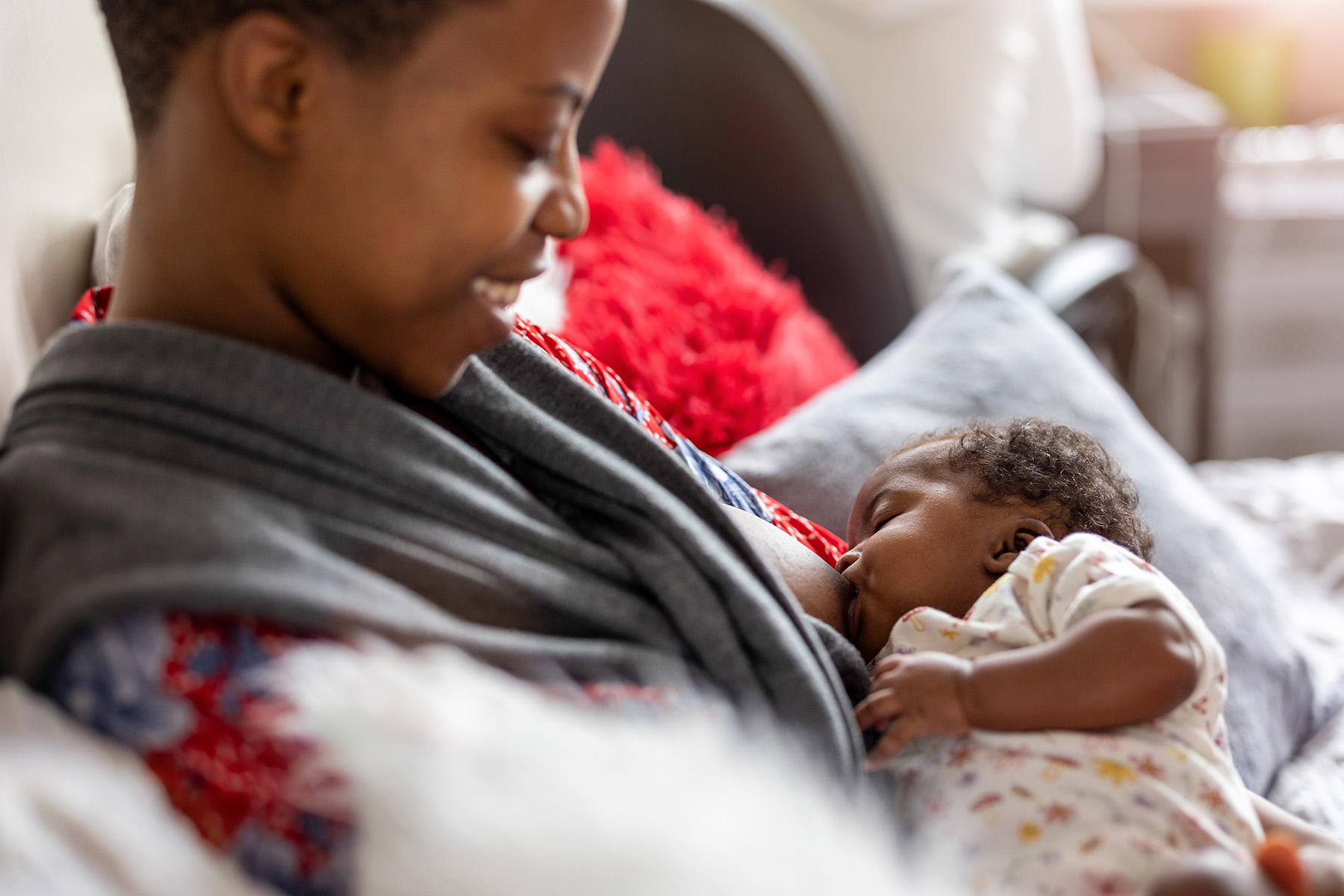As an expat who is expecting, a new chapter abroad begins when giving birth in a foreign country. There are many choices to make, not least of all whether you and your new baby are comfortable at home. From the pregnancy to after birth, here’s what you need to know when having a baby in Luxembourg, including your insurance options.
International health insurance provider Cigna Global takes you through the process, explaining what services are provided by the public Luxembourg healthcare system, and whether or not your child can be eligible for Luxembourgish nationality. There’s good news for expat women in Luxembourg; they can, but under specific conditions.
This guide covers the following topics:
- Pregnancy and childbirth in Luxembourg: an overview
- Accessing maternity services in Luxembourg
- Insurance for maternity costs in Luxembourg
- Pregnancy testing in Luxembourg
- Prenatal care in Luxembourg
- Abortion in Luxembourg
- Having a baby in Luxembourg: home, hospital, or birth house?
- Naming and registering a baby in Luxembourg
- Non-residents having a baby in Luxembourg
- Parental leave in Luxembourg
- Child benefits in Luxembourg
- The important terms (French – German)
- Useful resources
Cigna Global
Expecting a baby in Luxembourg? Enjoy peace of mind with Cigna Global’s private healthcare. Gain access to top maternity care, pediatricians, specialists, and a global network tailor-made for your growing family. Start your parenting journey with confidence – Cigna Global has you covered.
Pregnancy and childbirth in Luxembourg: an overview
More than 6,000 babies are born in Luxembourg each year, a statistical rate of 1.47 children per woman. That’s a 17% increase between 2005 and 2015, according to the country’s national health fund, Caisse Nationale Santé (CNS). Boys and girls are evenly balanced, as are babies born to married couples and those born to parents in other circumstances, such as couples living together or in a civil union.

The number of foreigners having babies in Luxembourg doubled over the same period, from 6.9% of the total in 2006 to 12% in 2015.
The CNS says a pregnancy in Luxembourg costs on average €7,780. However, the state fully covers the cost of having a baby for residents. In addition, there are three different allowances for new parents. Luxembourg makes childcare payments until the age of 18; parents can extend this to the age of 25 under specific conditions.
You can choose to have your Luxembourg baby in a hospital or a birth house, or even at home. Your right to making a decision is part of local law since 2014; don’t hesitate to ask as many questions as you need to.
Public insurance doesn’t cover home births, although some costs may be recovered through private insurers. Private medical insurance is also worth looking into for those who want extra facilities or security.
Accessing maternity services in Luxembourg
In Luxembourg, the principal health contact for pregnant women is a doctor, not a midwife. This means you won’t deal with only one friendly face throughout your pregnancy as is common under the continuity model of midwife care in some other countries.
However, you can direct any questions you may have to your gynecologist. Seek to establish a relationship with a gynecologist as soon as you think you may be pregnant. Ask your friends or colleagues for recommendations. Compare some of local professionals from user reviews with Médecins Spécialistes.
You can easily choose your own doctor – and change them at any time. All Luxembourg residents can register with a doctor at a clinic local to them. After registration, your clinic connects you to a gynecologist. You can also find a list of doctors in Luxembourg by specialty or location through College Medical.
Most doctors work as private practitioners but are usually contracted to provide services through the state-funded CNS. Check that they are contracted to provide state healthcare to avoid excess fees. Doctors also work with specific hospitals. Check that your preferred specialist consults with the hospital where you’d like to give birth to avoid unpleasant surprises later.
Expatica’s guide has more about finding a doctor in Luxembourg.
Insurance for maternity costs in Luxembourg
All employees and self-employed workers must make sufficient social security contributions in Luxembourg to be entitled to healthcare services. If you have a job, healthcare contributions will be automatically taken out of your wages by your employer. These payments entitle you to access medical services at any local doctor under Luxembourg’s health insurance system.
Someone working in Luxembourg but living abroad (i.e., a cross-border worker) must follow healthcare procedures in their country of residence. The CNS also co-insures partners of Luxembourgish workers, as long as they live in the country. You’ll need to fill out a form called S041/E104 or similar in this case.
The CNS works through a system of reimbursements for out-patient consultations. It settles pharmacy, hospital, physiotherapy, and laboratory costs directly with the provider.
Public health insurance covers the majority of maternity costs. It’s useful to have private insurance to fill any payment gaps, however. Here are some of the expat-friendly international health insurance companies which provide maternity coverage:
Pregnancy testing in Luxembourg
It’s easy to buy a home pregnancy test in Luxembourg. Most pharmacies and supermarkets sell home-testing kits and these are largely accurate from the first day your period is due. There are also tests you can use earlier – ask the pharmacist which works for you.
You can also proceed directly to your clinic for a blood test. Like urine tests, these look for the beta HCG hormone, which is produced by the placenta, but blood tests usually detect the hormone earlier.
However, you will need a prescription for any lab work if insurance is to cover it.
Prenatal care in Luxembourg
Pregnancy care in Luxembourg is led by the gynecologist and well regarded internationally.
Before having a baby in Luxembourg, you’ll visit the obstetrician regularly. There, you’ll receive monthly check-ups on blood, pressure, urine, as well as tests on your heart rate.
They also perform at least three ultrasound scans. It’s also standard to be asked if you want an ultrasound at each appointment to monitor the baby’s growth. In Luxembourg, 3D scans are also available; while they offer beautifully enhanced images, they don’t provide extra medical information.
Expect a battery of other tests. By the end of the first trimester, doctors will run a blood check for rubella, toxoplasmosis, and the cytomegalovirus (CMV). In the fourth month, you may be offered a risk assessment test for chromosomal abnormalities such as Down’s Syndrome or aberrations of the central nervous system, such as spina bifida. After that, there’ll be blood and urine tests every month.
Immediately before birth
One month before birth, besides assessments for the overall health of both you and your baby, the doctor will also seek to determine the baby’s position (if they’re facing head down and ready for birth) and estimated birth weight, as well as the size of your pelvis. A smear test for Group B streptococci is also run at this point; if it’s positive, the medical team will usually administer antibiotics at the time of birth.
Feel free to ask as many questions as you like about the procedures. The standard protocols are discussed in the Grand Duchy’s free Quoi de Neuf guide, which is also published in several languages. The global organization Evidence Based Birth also has plenty of information on the different options available to expectant mothers.
Other medical consultations ahead of having a baby in Luxembourg include at least two sessions with midwives in the fifth and seventh months. There’s also a meeting with an anesthetist in the ninth month to discuss epidurals and emergency procedures. If you’re writing a birth plan, make sure to discuss it with your midwife by the seventh month.
Antenatal classes
There is a wide range of prenatal classes available in Luxembourg. The different maternity hospitals usually offer classes in English, French, or Luxembourgish; German-language sessions are also possible.
These are generally free and cover a wide range of topics from diet and naturopathy to emotional support, sexual counseling and yoga, acupuncture, and hypnobirthing techniques. Some classes are available at:
Hospital-affiliated classes
- Centre Hospitalier du Nord
- Centre Hospitalier Emile Mayrisch
- Clinique Privée Docteur Bohler
- Initativ Liewensufank
- Maternité Grande Duchesse Charlotte
Social or independent organizations
You can also find an independent midwife to come to your home, either before or after birth.
Doulas
Doulas as birth companions and post-birth supporters give advice and other support during pregnancy, during birth, and after birth. While they have received general nurse training, their role lies more within the practitioner and emotional aspects of pregnancy. Initiativ Liewensufank is one doula center in Luxembourg that aims to improve birthing through doula services.
Abortion in Luxembourg
Abortion in Luxembourg has been legal since 1978. A woman can choose to terminate a pregnancy up to 12 weeks after conception (or 14 weeks after the last menstrual period). She needs two consultations with a doctor (one medical and one psycho-social), plus a waiting period of at least three days. Later-period abortions are only possible when two doctors certify there is a danger to the mother or fetus. Underage patients must be accompanied by an adult to the consultations and to the surgery itself.
Doctors in Luxembourg may opt out of providing abortion services on grounds of conscience. By law, they must refer the patient to another medical practitioner.
Having a baby in Luxembourg: home, hospital, or birth house?
Where do you want to give birth and in what type of surroundings? While many countries encourage hospital birth, Luxembourg is open to alternatives, and there are a few unique and attractive options. Talk to your friends and fellow moms-to-be to see what plans they’ve made. Remember that this is your own decision to make. Regardless of your choice, you’ll always have a midwife and a pediatrician schedules a check-up within 48 hours of delivery. Three general ideas you’ll hear about are home births, birth houses, and hospital births.
Homebirth
Homebirth in Luxembourg is also possible. You can rent a birthing pool, and being in a natural non-clinical environment simply feels better to some women.
Mothers-to-be should communicate their desire for home birth to their gynecologist or obstetrician as early as possible. On average, there are six or less home births in Luxembourg each year; however, the roles of a midwife completely overlap should you decide to have a birth at home, and visit Sages Femmes for more about midwives for home births. While home birth are uncommon, they are a consideration among many women having their second or third child.
If you want to give birth at home, the CNS (National Health Fund) doesn’t cover the medical costs. However, extra possibilities like reclaiming midwife costs could work depending on if you have a private insurer and what their regulations are. Call your insurer to confirm what will and will not be covered during a home birth.
Birth house
If home births are of interest but the thought of being far from medical help is a concern, consider a birth house. Birth houses are a healthcare center with delivery nurses, midwives, and obstetricians to facilitate births in a more natural environment. Birthing tubs, queen-size beds, having family present, as well as the freedom to move around are things that hospital births don’t usually have. For insurance, while the Caisse Nationale Sante (CNS) coverage still depends on the case. The European Health Assurance covers home births for those who work at European institutions.
Some birth houses close to Luxembourg are:
- Arche de Noé – Maison de Naissance, Belgium
- Geburtshaus Merzig, Germany
- Geburtshaus Saarburg, Germany
- Un Nid pour Naître – Maison de Naissance, France
Hospital births
Hospital births are by far the most common method of having a baby in Luxembourg. There are four maternity hospital wards to consider. All delivery nurses receive midwifery training. When the time comes, your labor bed doubles as a delivery bed in your private room. Women who have a hospital birth in Luxembourg generally stay three to four days.
In some cases, mothers can choose for early discharge with home visits from a midwife up to the tenth day after birth. This is ambulatory or outpatient delivery; the midwife assumes the role of principal carer, offering information and advice. Should a Cesarean section be necessary, the hospital extends your stay to four to seven days.
The sickness fund reimburses both for hospital births as well as outpatient births.
Maternity hospitals in Luxembourg include:
- Esch-sur-Alzette: Centre Hospitalier Emile Mayrisch
- Ettelbruck: Centre Hospitalier du Nord (CHdN)
- Luxembourg City: the Maternité Grande Duchesse Charlotte (CHL) and the Clinique Privée Docteur Bohler
Need to know: labor, when to go to the hospital, and birth
Before labor, moms-to-be have usually come up with an ideal birthing plan and perhaps also have a few backups. What is your take on pain medication? On skin to skin, or any post-placenta wishes? Birth plans are great to help get your team of supporters, midwives, and gynecologists on the same page while in labor. See if you can translate your plan into French or German.
When it comes to labor, modern advice recommends staying at home once you go into labor until the time your contractions are regular and strong, and are coming every four or five minutes or so. At this point, you should call your doula or the delivery ward (salle d’accouchement) at your hospital. The nurse will take you through a series of questions and recommend a course of action.
Head to the hospital immediately if: you’re bleeding; your waters have broken and the fluid is green, brown, or yellow; you’re in unbearable pain; you’re vomiting; or the baby isn’t moving. Call 112 and ask for a SAMU or ambulance. Phone ahead before arrival to ensure the hospital is ready to follow your birth plan. Maternity doors might not be open after 22:00, but there’s usually a bell to press when you arrive.
At the hospital
When you arrive at the hospital, you need your identity card, healthcare card (carte de securité sociale), blood group card, the name of your pediatrician, and any extra insurance documents (mutuelle) if necessary. Bring your own towels, pajamas and comfortable clothing, slippers, disposable undergarments, breast pads, toiletries, and tools for relaxation.
At the hospital, midwives handle standard procedures and monitoring. Their initial questions about your contractions and water break help them determine how far into labor you are. There may be a vaginal examination to see how dilated your cervix is and see your baby’s position. They will check your vitals, lightly push and use a Doppler monitor to determine your baby’s heart rate.

Hospitals in Luxembourg follow a general rule of one labor supporter, such as your partner. If you would like more ask your gynecologist about the policy.
While you are in labor the midwife will report your progress and stats to the gynecologist over the phone. Any discussion on how to move forward will of course only happen if you agree to their recommendations. If there is a need for a Cesarean operation, or a surgical cut through the abdomen and womb to birth the baby, anesthesia is on standby.
Postnatal care in Luxembourg
Once the child is born, the pediatrician will do a check-up within 48 hours. There will continue to be regular check-ups with the same pediatrician or a new one should you wish to switch. You’ll receive a book for the baby with all the necessary details on future checkups and vaccinations. The mother will have a medical check-up after two weeks.
Luxembourg offers plenty of places for moms to head to – and take their new baby along. From yoga and Pilates to swimming and gyms, there are plenty of choices. Here are some options to consider:
- Babies under one year at Initiativ Liewensufank
- Baby Boot Camp at GetFit
- Baby swim classes at Syrdall Schwemm
- Claire Marie Pilates and Wellness
- Classes and camps at The Little Gym
- General fitness classes at Fitdankbaby
- Luxembourg National Swimming and Rescue Federation
- Pilates and outdoor sports with Julie Wagner
- Postnatal yoga at Yogaloft
- Sensory learning and development at Baby Sensory
- Toning and stretching at MammaFit
Vaccinations in Luxembourg
Children have a rigorous schedule of vaccinations in Luxembourg. This starts at the age of two months with a combined dose of diphtheria, tetanus, whooping cough, HIB influenza, polio, and hepatitis B, as well as shots for the rotavirus and pneumococci. Subsequent inoculations follow at three, four, 12 and 13 months, with a final shot between 15 and 23 months. After that, the next set occurs at five years.
The official website has a calendar of vaccinations in Luxembourg (in French).
Nurseries and childcare
Over half of the families living in Luxembourg use some type of childcare. More than a third use a daycare crèche for kids four years old or younger. Children spend nearly 30 hours a week at some form of daycare. A smaller portion uses the services of a nanny, au pair or paid parental assistant.
Children age four and under who are living in Luxembourg can be enrolled in a crèche, similar to a nursery school. These are available to all Luxembourg residents and highly recommended by the Luxembourg Ministry of Education.
More about the early learning system is at Expatica’s guide to childcare in Luxembourg.
Breastfeeding
Nursing mothers in Luxembourg who must return to work are entitled to two 45-minute breaks for breastfeeding during the workday. More information on the law and what you’re entitled to is available at the Caisse Nationale de Santé (in French).
Luxembourg’s maternity hospitals all offer help and support with feeding. You can also book a home visit with a community midwife. Health insurance covers the first visit. Ask your doctor to prescribe more if you need them or pay for extra. Women who’ve chosen ambulatory or outpatient delivery are entitled to 10 home visits from a Sage Femme.
Breastfeeding classes and support groups in Luxembourg include:
Naming and registering a baby in Luxembourg
Can’t abide by the patriarchy? Luxembourg’s got you covered. Since 2006, parents in Luxembourg can give their child either or both of their own family names, regardless of whether they’re married. The only requirement is that all children of the same parents must have the same family name. More information on names is available at the Luxembourg government website.
Your child must be named when you register him or her. By law, this is within five days of birth; if the fifth day is a holiday, on the next working day. Registration must be done at the Office de l’Etat Civil in the commune where you live. Either parent may register the child, and in their absence, the doctor, midwife or anyone else present at the birth. Bring the birth declaration (avis de naissance) from the midwife, wedding certificate, identity card of the mother, and whoever is declaring the birth. Unmarried parents must bring a declaration stating the child’s chosen name signed by both parents.
The commune issues several copies of the official birth certificate. You must contact your embassy and follow any national procedures your country may have. This measure is to prevent the child from becoming stateless or automatically receiving Luxembourg nationality.
You must also present the birth certificate to your local municipal administration – if that’s different from where he or she was born, to your employer, to the National Fund for Family Benefits (CNPF) as well as registering your child’s birth with the insurance fund to obtain a social security number and any pertinent allowances.
Non-residents having a baby in Luxembourg
Visitors to Luxembourg are required to obtain travel insurance before visiting the country. While EU citizens are covered by reciprocal rules and their European Health Insurance Card is usually enough, non-resident tourists and visitors must have insurance – or pay privately for maternity costs.
Should you find you need to give birth earlier than planned in an emergency, ring Luxembourg’s emergency helpline at 112. You’ll be directed to one of the hospitals on this page, and the procedures are as outlined above.
Typically, travel insurance covers you for complications associated with pregnancy and childbirth but not for routine treatments or a normal birth. Check with your insurer before leaving or take out a private insurance policy that specifically covers delivery.
The CNS estimates that the average pregnancy cost €7,780 in 2015. Exact delivery costs of uninsured births are not available.
Can your child get Luxembourgish citizenship?
A child must have one parent with Luxembourgish nationality to be eligible for citizenship of this EU country.
Children who’ve been resident in Luxembourg for at least five years when they turn 18 are eligible to apply for citizenship, or if one of his parents or adoptive parents has been legally and habitually resident in Luxembourg for at least 12 consecutive months immediately preceding the birth. This second condition only applies to children born after 1 July 2013. More details are available at the government website Guichet.lu (in French).
Parental leave in Luxembourg
Maternity leave (allocation de maternité) is available for working mothers for eight weeks before and 12 weeks after birth.
Pregnant women must have had social security for at least six months during the year preceding the start of maternity leave. In order to take leave, you must send a medical certificate indicating the presumed date of delivery to the National Health Fund (CNS) within the last 12 weeks of pregnancy. Calculate your maternity leave allocation and dates at the CNS website.
The child’s father may benefit from 10 days’ extraordinary leave on the occasion of having a baby in Luxembourg.
The Luxembourg Chamber of Employees has a detailed brochure about parental leave on their website.
In addition, parents are able to take leave of six months. One parent must take the leave immediately after the end of maternity leave, while the other can book their leave at any time up to the child’s sixth birthday. However, both parents cannot take parental leave at the same time. One person’s leave cannot be added to the other’s.
Parental leave is paid by the Family Allowances Fund Office. The six months parental leave entitles the parent to a monthly allowance (reviewed annually, but corresponding approximately to the minimum legal salary). The employer must be informed in writing. They must re-employ the worker in an equivalent position at the end of the parental leave.
More information is on the official website (in French).
Child benefits in Luxembourg
To receive maternity benefits, women must go through five medical examinations and a dental check, the first within the initial three months of pregnancy. A gynecologist performs a number of ultrasound exams, blood tests, urine tests, and triple tests to check for any abnormalities. Women over 35 will also receive an amniocentesis fluid sample test just for extra precautions.
Women on maternity leave are entitled to cash benefits paid by the CNS. The allowance corresponds to the highest salary received during the last three months preceding maternity leave and may be supplemented by the average of the supplements and accessories of the last 12 months preceding the month preceding the beginning of the maternity leave. For independent, self-employed women, the allowance corresponds to the contributory base applied at the time of the maternity leave, while the payment for part-time workers is established according to the minimum hourly social wage.
Pregnant women are required to remain employed during their maternity leave, but can resign afterwards without a notice period only if they want to devote themselves exclusively to raising their child. Resignation without notice is not possible for those who want to change employers at the end of their maternity leave. The Luxembourg government details the conditions for maternity leave and benefits on its website.
The important terms (French – German)
- Pregnancy: la grossesse – Schwangerschaft
- Childbirth: l’accouchement – Geburt eines Kindes
- Maternity leave: congé de maternité – Mutterschaftsurlaub
- Parental leave: le congé parental – Elternurlaub
- Midwife: sage-femme – Hebamme
- Father: père – Vater
- Mother: mere – Mutter




